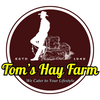Cooling Your Herd: Beating July’s Heat for Livestock
July’s heat is in full force, with temperatures soaring into the 90s and often hitting triple digits, making it a challenging time for your livestock. Horses, cattle, and goats feel the summer sun just as much as we do, and their health depends on staying cool and hydrated. Whether you’re managing a 4H project animal, a dairy herd, or a ranch horse, now is the time to take steps to prevent heat stress. Here’s how to keep your herd comfortable, with a couple of products from Tom’s Hay Farm to support your efforts.
Heat stress can sap energy, reduce milk production in dairy cows, and even lead to serious health issues if not addressed. Signs to watch for include heavy panting, reduced feed intake, or lethargy—especially in horses and cattle. Providing shade is essential: set up portable canopies for pastures, ensure barns have open windows for airflow, or use natural shade like trees. For dairy cows and horses, install cooling fans in barns to circulate air, and consider misting systems for larger herds, refreshing them every 15-20 minutes in peak heat. For 4H/FFA students, check show animals daily for signs of discomfort, and move them to shaded areas during the hottest hours, typically 2-6 PM.
Water and nutrition are critical in July’s heat. Ensure all livestock have constant access to clean, cool water—horses need 10-15 gallons daily, while dairy cows may require 25-30 gallons, especially if lactating. Clean troughs twice weekly to prevent algae buildup, and place them in shaded spots to keep water palatable. For feed, switch to low-sugar options to avoid digestive issues, like Bermuda hay from Tom’s, with its low non-structural carbohydrates (10-12%) ideal for horses and goats in summer. Pair it with Electro Dex Electrolytes, also available at Tom’s, to replenish salts lost through sweat—use 1-2 ounces daily for horses or goats, mixed into feed or water, but consult your veterinarian for cattle dosing or specific needs.
Monitor your herd closely and act fast if you notice trouble. For example, if a horse refuses water or a cow’s milk output drops, provide electrolytes immediately and consider a vet check for heat exhaustion. For 4H students, keeping a log of your animals’ behavior (e.g., breathing rate, appetite) is a great way to learn livestock care and spot issues early.
Visit Tom’s Hay Farm for premium Bermuda hay and Electro Dex Electrolytes to keep your herd cool and thriving. Have questions about heat management? Stop by or give us a call—we’re here to help your animals beat the summer heat!



